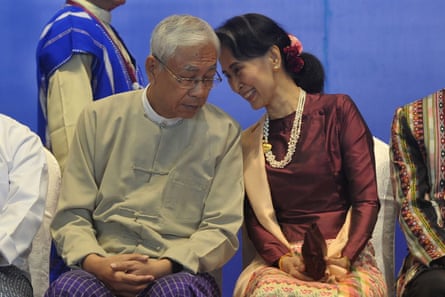The president of Myanmar, Htin Kyaw, has stepped down, saying he is “taking a rest” following health issues.
Htin Kyaw was an important ally in the government for state counsellor Aung San Suu Kyi, who is constitutionally barred from the presidency, and the pair were childhood friends. Htin Kyaw was nominated as president by Aung San Suu Kyi’s party, the National League for Democracy, in 2016 and she exerted much of her influence through him.
His resignation comes at a precarious time for Myanmar and Aung San Suu Kyi, who is under pressure from the international community to address the campaign of violence carried out by the military in Rakhine state – described by the UN as having the “hallmarks of genocide” – which has led to an exodus of 700,000 Rohingya Muslims over the border to Bangladesh.
The Myanmar government has denied claims of ethnic cleansing and pledged to begin repatriating the Rohingya, though so far it has approved the return of only 374 people.
Reports that Htin Kyaw had been experiencing ill health in the past few months had been vigorously denied by the government. However, on Wednesday the state counsellor’s office said he was stepping down to recuperate after undergoing multiple treatments and surgery.
Government spokesperson Zaw Htay told the Guardian: “Yes, he has resigned. He just had an operation but it was successful. We will now start the process for electing the next president within seven working days according to the constitution.”

Htin Kyaw was the first Myanmar president since the 1962 coup to have no connections to the military.
In the interim, his position will be held by the military-nominated vice-president Myint Swe, an ex-military officer who, while leading the Yangon Command in 2007, oversaw the brutal crackdown of the Saffron revolution.
Myanmar’s electoral system requires that the president be voted in from a selection of names put forward by lawmakers, including at least one nominee chosen by the military, which retains a quarter of seats in parliament.
“We’ve been hearing that he [Htin Kyaw] might make such a step for some months, so this is no surprise,” said Dr Khin Zaw Win, a former political prisoner and director of the Tampidipa institute in Yangon.
“I think the new person will have to take some more responsibility from the state counsellor. It was a mistake for her to centralise so much authority, leaving U Htin Kyaw as a puppet.”
He said Zaw Myint Maung, a popular MP who is also close to Aung San Suu Kyi, was being tipped – but he has a son living abroad who, if a foreign citizen, would constitutionally bar him from the role.
Another frontrunner is Win Myint, speaker of the house of representatives, a member of the NLD executive committee and another close confidante of Aung San Suu Kyi.
He too resigned from his post on Wednesday, a sign he intends to put his name forward.
Myanmar political analyst Richard Horsey said the choice had to be from Aung San Suu Kyi’s “inner circle of trusted loyalists”.
“The president has full executive authority under the constitution so it requires a personal pact in order for Aung San Suu Kyi to maintain the situation where she is the actual seat of power.”
Cape Diamond contributed to this report
